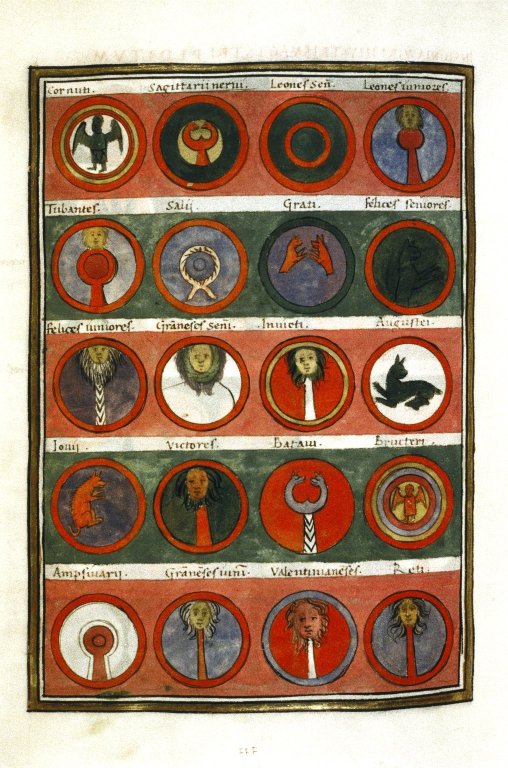|
Arglebargle III posted:Classical Greece portrayed lots of women as sluts, it was kind of their go-to stereotype. Just some context. A lot of European cultures once held the belief that women are relentless horndogs and men need protection from their rampant sexuality
|
|
|
|

|
| # ? May 9, 2024 22:01 |
|
I think the Spartans had to lean hard on a reputation for past victories after they abolished the agoge. My old, excessively ornery classics professor was a Sparta expert and once described it to us as a mandatory Hitlerjugend/bootcamp/bachelor degree for young men
|
|
|
|
Fuligin posted:I think the Spartans had to lean hard on a reputation for past victories after they abolished the agoge. My old, excessively ornery classics professor was a Sparta expert and once described it to us as a mandatory Hitlerjugend/bootcamp/bachelor degree for young men WhIch part is the bachelor degree part?
|
|
|
evilweasel posted:the article suggests that the spartans were fine actual soldiers when it came to sticking people with the pointy end and had a little bit better ability to execute tactics on the battlefield (but nothing to write home about), and that yeah they basically were all hype. that they were bad at strategy, bad at logistics, and their tactical skill was minor compared to everyone else and significantly outclassed by macedonians and later romans. the implication from the argument i got was that spartan training wasn't actually that much more impressive than anywhere else (the agoge being more about indoctrination than training) and that in the end, individual skill of an individual in a phalanx may not be all that meaningful, especially if you are (as the article argues) dumb about when and where you use a phalanx to solve a problem I've heard the same from other sources. They focused heavily on individual skill and bravery over the kind of teamwork that really helps you win battles; this was not a unique problem to Sparta, but it certainly didn't help them. The bigger problem was that basing your society on an oppressed enslaved underclass doing all the important jobs for a functioning civilization and forcing every boy who can be in the army to be a soldier creates a very unstable society in the long term.
|
|
|
|
|
feedmegin posted:WhIch part is the bachelor degree part? honestly I'm not really sure, although I imagine they probably ended up learning a lot of institutional history and folklore by going through it. e; from what I recall of the city's later history, part of the internal controversy over the agoge was that it required landed men. As the city became more oligarchical in the Hellenistic period the concentration of land ownership lowered the pool of recruits. Re-instituting the agoge as a social practice was thus kind of associated with redistributive, 'democratic' politics. ee; scratch 'democratic,' I mostly mean 'populist.' I think there were at least two usurping kings in the city's late history who promised to restart the practice on a large scale Fuligin fucked around with this message at 23:26 on Jan 29, 2020 |
|
|
|
Poetry?
|
|
|
|
chitoryu12 posted:forcing every boy who can be in the army to be a soldier creates a very unstable society in the long term. They didn't even really do this. The Spartiates (the obligate soldiers) were around 5% of the population. The perioikoi (resident free non-citizens) another 10%. 85% of the population was enslaved. That's insane. A theoretical Lacedaemon polis with the same borders as Sparta but which used its agricultural output feeding its people instead of starving them into submission and turning the excess production into wealth for its hereditary nobles could almost certainly have fielded much larger armies
|
|
|
|
cheetah7071 posted:They didn't even really do this. The Spartiates (the obligate soldiers) were around 5% of the population. The perioikoi (resident free non-citizens) another 10%. 85% of the population was enslaved. That's insane. The helots were more like serfs than chattel slaves, they weren't really starving for the most part. I also don't think the Spartans ever starved anybody into submission, they just murdered helots if they ever tried to rise up. Spartan armies were larger than any other Greek polis', at least until the attrition from maintaining hegemony (i.e fighting every subjugated polis) bled them dry.
|
|
|
cheetah7071 posted:They didn't even really do this. The Spartiates (the obligate soldiers) were around 5% of the population. The perioikoi (resident free non-citizens) another 10%. 85% of the population was enslaved. That's insane.
|
|
|
|
|
Slim Jim Pickens posted:The helots were more like serfs than chattel slaves, they weren't really starving for the most part. I also don't think the Spartans ever starved anybody into submission, they just murdered helots if they ever tried to rise up. They were bound to the land rather than to an owner, like a serf, that's true. But every noble Spartan male, as a coming-of-age ceremony, acted as a state-sponsored terrorist in the local helot population, killing them freely with the express purpose of keeping them cowed into submission. Most slave societies theoretically have some protections for slaves; in classical Athens, for instance, killing a slave was still murder (though I highly suspect this was not enforced). In Sparta, they had a ceremony once a year to remind the nobles that killing helots was A-okay. If anything, slave isn't the right term because it undersells how few protections helots had As for the food issue, the two sources that essay cites are both a bit suspicious in their exact numbers but both agree that annual payment of food by helots was backbreaking in the minds of their authors, and both agree it was much higher than the more reliable numbers we have for the rent of medieval serfs. When an unreasonable rent is demanded by a landowner, children start dying and the ones that survive grow up smaller and weaker. If that rent was instead used to feed the helot family they'd have more, stronger sons to be conscripted. Whether or not this was an intentional policy seems irrelevant to me.
|
|
|
|
Slim Jim Pickens posted:The helots were more like serfs than chattel slaves, they weren't really starving for the most part. I also don't think the Spartans ever starved anybody into submission, they just murdered helots if they ever tried to rise up. Iíve never been sure what to think of this take. Some ancient sources claim that the Spartans went beyond killing helots who actually revolted and had secret police who basically killed helots because they could. Others deny this and claim that the krypteia was just a military recon unit that wasnít involved in internal repression. On one hand, as a general rule, you shouldnít underestimate how badly powerful people treat the underclass. On the other hand, defenders of Sparta might draw parallels to silly Enlightenment atrocity propoganda about medieval serfdom (ever heard of the droit de prelassment?).
|
|
|
|
I've always been suspicious of the whole random helot murderfest story. I have no evidence (though I've read other historians who are also suspicious) but it just... I dunno, it pings my bullshit detector. I have no doubt helots were treated badly but it sounds so much like propaganda about how barbaric the Spartans were, and our sources are so heavily Athenian. It's not a hill I would die on or anything.
|
|
|
Grand Fromage posted:I've always been suspicious of the whole random helot murderfest story. I have no evidence (though I've read other historians who are also suspicious) but it just... I dunno, it pings my bullshit detector. I have no doubt helots were treated badly but it sounds so much like propaganda about how barbaric the Spartans were, and our sources are so heavily Athenian. Even if it was "only" a half a dozen a year, and perhaps focusing on the old or the frail, that'd still leave a mark!
|
|
|
|
|
Iím not sure anyone could make the krypteia up, itís such a loving weird thing. I get that Plutarch isnít the most reliable source ever but thereís gotta be some basis in fact there.
|
|
|
|
What did Sparta even have contemporarily as its "hype mechanism"? I thought the whole reason why there's so many weird takes on Sparta is that there's no direct sources and most of the second, third, fourth hand sources that we do have are all thrown into question by the individual source having their own motivation to embellish the truth. So what's left behind is full of myths and outright lies that can be fertile ground for later philosophers to build their own weird unique take, while we're much more sure about what Athenians were like.
|
|
|
|
i'm imagining something akin to the white terrorist groups of the United States' reconstruction period, with the caveat that the Spartans weren't trying to actually remove the helots from the land, just "keep them in line"
|
|
|
|
There's only like two sources that mention the Krypteia. Plato's account, which says it was a gruelling endurance test for the agoge, but unrelated to with helots. And Plutarch's account, which he ascribes to Aristotle, which says it was a secret murderfest. That's a troubling contradiction, because even if you take Plutarch at face value, you just get Aristotle and Plato contradicting each other, which is nigh-useless for discerning the truth. Plutarch also claims that the crypteia was a recon unit, but in a later incarnation of the Spartan state. So whether or not they were, it had nothing to do with Spartan society at its most rigid. I find it hard to believe that the helots would ever serve in the Spartan military without deserting, or accept manumission from the Spartiates, or even turn in rebellious Spartiates promising freedom, if they were subject to random murders every year. It's also weird that none of the many anti-spartan writers would neglect to mention the crypteia between Plato and Plutarch, despite all the other violence they reported between spartiates and helots.
|
|
|
|
Welp, my interest is now piqued, and I've sent an email to my old professor. I'll let y'all know if I get a response back
|
|
|
|
Grand Fromage posted:I've always been suspicious of the whole random helot murderfest story. I have no evidence (though I've read other historians who are also suspicious) but it just... I dunno, it pings my bullshit detector. I have no doubt helots were treated badly but it sounds so much like propaganda about how barbaric the Spartans were, and our sources are so heavily Athenian. i do not think there's any way a society with 6% of the population enslaving 85% of the population, with the remaining people not enslaved but not really given any real status or rights, lasts without pretty vicious terroristic methods of one kind or another used to cow the slave population. the deep south at the height of its slaveholding had a third of the population enslaved. the details may not be right but i think there's basically no doubt that they were atrociously treated in one way or another.
|
|
|
|
The helots of subjugated Messenia are probably a different matter from the helots of Lacadaemonia. The Messenians were in outright revolt often enough that the Spartans probably did terrorize them ruthlessly and stories of the krypteia massacring helots are probably rooted (if anything) in efforts to suppress the Messenians.
|
|
|
|
chitoryu12 posted:I've heard the same from other sources. They focused heavily on individual skill and bravery over the kind of teamwork that really helps you win battles; this was not a unique problem to Sparta, but it certainly didn't help them. The bigger problem was that basing your society on an oppressed enslaved underclass doing all the important jobs for a functioning civilization and forcing every boy who can be in the army to be a soldier creates a very unstable society in the long term. the most notable thing about Spartan politics however is in fact its remarkable stability. They maintained the system of duel monarchy and oligarchy basically from the dawn of written history right up until the Roman subjugation of Greece virtually uninterrupted. This was really quite remarkable for greece, where cities often experienced many periods of foreign subjugation and chaotic and brutal civil infighting. Sparta. . . on the other hand never had anything remotely comparable to the events Thucydides described in Corcyra, nor anything like what was inflicted on Athens by the Thirty Tyrants. I said before that Sparta had a talent for not loving up, and I really don't think it was just a matter of luck. Spartan politics just kinda. . . worked to a remarkable degree, and to an extent that was unmatched anywhere else in Greece. It tended to be risk adverse and conservative, but considering what happened to Thebes after they challenged Alexander the Great, that's hard for me to criticize. Greece went through several different hegemons, but Sparta held that role for the longest and lost the position more gracefully than any of the others Also while I'm really not an expert on the whole relationship between Sparta and the helots, I think there are some obvious problems with narratives that describe it one of never ending hostility. One thing that stand out to me, is near the end of the independent history of Greece, the coastal cities of Laconia mostly seem to have wanted to remain in political union with Sparta, even as the achaean league tried to peel them away by force.
|
|
|
|
"καλύτερα πράγματα δεν είναι δυνατά!" cried the spartiate as he stabbed my wife in the head sixteen times. In the morning he informed me he would require my best goat. Thank Zeus I'm not an Athenian, though! They're so citified.
|
|
|
|
|
"From the dawn of written history" isn't a great measurement for a place where written history notoriously never dawned.
|
|
|
|
SlothfulCobra posted:"From the dawn of written history" isn't a great measurement for a place where written history notoriously never dawned. but we have an extensive historical record covering Sparta? Even if most of it was written by Athenians. There were some issues in the late Hellenic period as a small number of oligarchs basically took over almost all the land in Sparta and as Sparta suffered repeated defeats. However unlike, Corinth, Thebes, and Athens, Sparta was never razed, sacked, nor had its citizens carted off into slavery. Cities like Thebes constantly strongly to keep the Boeotian league under control, and their leadership was always tenuous in a way Sparta's never was in Laconia. Part of this is of course just that Sparta was in a much more defensible and out of the way location than Athens or Thebes, but still.
|
|
|
|
The small number of oligarchs who were enshrined as ruling in the spartan constitution didn't have their power overthrown by tyrannies it's true I do wonder if the lack of razing and sacking wasn't mostly due to Sparta famously not having anything to raze and sack
|
|
|
Squalid posted:but we have an extensive historical record covering Sparta? Even if most of it was written by Athenians. There were some issues in the late Hellenic period as a small number of oligarchs basically took over almost all the land in Sparta and as Sparta suffered repeated defeats. However unlike, Corinth, Thebes, and Athens, Sparta was never razed, sacked, nor had its citizens carted off into slavery. Cities like Thebes constantly strongly to keep the Boeotian league under control, and their leadership was always tenuous in a way Sparta's never was in Laconia.
|
|
|
|
|
Yeah when the Spartans enforce an oligarchy on Athens at the end of the Pelopponesian war--an oligarchy that even Sparta-loving Xenophon agreed was terrible--the real power was held by roughly the same number of people in the Spartan Gerousia and the number of people who "mattered" to them (they drew up an explicit list of rich people whose opinions they bothered to even pretend to care about) was roughly equal to the number of Spartiates.
|
|
|
|
cheetah7071 posted:The small number of oligarchs who were enshrined as ruling in the spartan constitution didn't have their power overthrown by tyrannies it's true It reminds me of the Ďstabilityí of the Roman senate: when your societyís an insane plutocratic dystopia, itís hard for internal forces to displace the small class of rich dudes with their boots on everyone elseís neck. To be fair, though, Roman society also encouraged rich dudes to pursue at least some token wealth redistribution via public works programs and extensive patronage networks.
|
|
|
|
When communications were extremely primitive, the power that city-based elites could impose on the rural masses was always massively delayed and negotiable, and the countryside basically existed as a society on its own, particularly the large latifundia. And since crop yields basically did not grow, due to lack of technological innovation or market pressure, there was not usually a turning of the screw making the conditions of the peasants worse and worse over time, like there were in the middle and early modern ages. So that allows for an inherent stability of the agricultural system
|
|
|
|
FAUXTON posted:Roman/ancient history: OSHA *Latin for 'would not approve of'* SPQR
|
|
|
|
Spartans definitely has the best shield logos We can all agree on that.
|
|
|
|
euphronius posted:Spartans definitely has the best shield logos Idk about this, thereís some pretty sick designs in the Notitia Dignitatum 
|
|
|
|
ngl I thought the shield design in Row 2, column 3 was ancient gangsigns at first glance
|
|
|
|
Pretty sure they used row 4, column 3 in Conan the Barbarian
|
|
|
|
Ras Het posted:When communications were extremely primitive, the power that city-based elites could impose on the rural masses was always massively delayed and negotiable, and the countryside basically existed as a society on its own, particularly the large latifundia. And since crop yields basically did not grow, due to lack of technological innovation or market pressure, there was not usually a turning of the screw making the conditions of the peasants worse and worse over time, like there were in the middle and early modern ages. So that allows for an inherent stability of the agricultural system The condition of peasants to go from bad to worse is pretty normal, historically speaking? In Sparta we would say they went bad to worse pretty quickly and then stayed bad for many centuries. In other societies the peasants tried to make things better for themselves, and occasionally succeeded, which leads to history, whereas in Sparta they appear to have simply ended up dead.
|
|
|
|
Nessus posted:I'm not sure how to tell you this but I think the spartiates were the small number of oligarchs and "citizens" is doing a lot of work in your sentence here. Even if we want to parse the helots as essentially serfs rather than the image that blogger paints, they were still what, 80% of the Spartan population? Well it can be difficult to talk about some of these issues over long time spans, because society changed a lot over time. By the time Cleomenes III becomes king in 235 however, there may have only been ~100 families that actually qualified as spartiates. Everybody knows about the issue with low birthrates, but Sparta wasn't actually running out of people per se, rather the decline of the spartiate was a result of wealth concentration. Overtime, control of land consolidated within a smaller and smaller group. That doesn't mean Sparta can only field armies of 100 people though, they just did what all the other Greek states did. That is to say they hired mercenaries and recruited soldiers from the lower classes. I really don't know enough to have a strong opinion opinion about the status of the helots. However even in Athens around 300 BC there were probably twice as many slaves as citizens. As far as Greek cities went the slave:citizen ratio in Sparta was probably on the high end but it wasn't a radical departure from the Greek norm. And while writers like Thucydides describe the Spartans as preoccupied with the threat of helot revolt, again a comparison with other Greek cities is relevant. Both Thebes and Athens at the height of their power spent a ton of time and energy working to bully and dominate their respective junior league partners, and the greatest threat to their power was a revolt among subjected cities. Something I noticed in Herodotus was also possibly relevant, he tends to describe the state of one city being subject to rule by another as "slavery." Not in like a legal sense of being unfree persons, but just in the sense of not having self rule. I'm not sure if this is a translation issue or what, but when contextualizing how the Greeks talked about politics it seems relevant. So when we see writers talk about revolts against Spartan rule in Arcadia, I think most of the time time these weren't like slave revolts, but more like the revolts of the Delian league against the Athenians. I guess to organize and summarize my thoughts I think some people are going too far with the revisionist history. From the sixth century BC until the Theban ascendancy, Sparta is the preeminent military power in Greece. Even after the rise of Macedon, Sparta remains one of the most important Greek states until the Roman conquest, and until just before the very end Sparta never has to surrender its institutions or government. I also think this long period of strength is attributable more than anything else to Sparta's remarkably stable and effective government. It doesn't matter if the individual Spartan soldier was any better than his peers, because the Spartan state used them much better than everyone else. The Spartan government was unquestionably good at serving its own interests, regardless of if that was bad for the helots.
|
|
|
Squalid posted:I really don't know enough to have a strong opinion opinion about the status of the helots. However even in Athens around 300 BC there were probably twice as many slaves as citizens. As far as Greek cities went the slave:citizen ratio in Sparta was probably on the high end but it wasn't a radical departure from the Greek norm. And while writers like Thucydides describe the Spartans as preoccupied with the threat of helot revolt, again a comparison with other Greek cities is relevant. Both Thebes and Athens at the height of their power spent a ton of time and energy working to bully and dominate their respective junior league partners, and the greatest threat to their power was a revolt among subjected cities. I'd just finished that set of articles myself so it's definitely fresh in my mind, but according to the author Bret Deveraux there was a huge differences between the two states, there's this chart too which shows it:  Now I don't have the ability to judge how correct he is, but that seems like a radical departure.
|
|
|
|
|
What were slave:free levels like in the near east in the first millennium BC? Intentionally broad because I'll take anything (but enough about my love life). Edit: I was wondering how things changed in Athens and Wiki provided me with this nugget "Between 317 BC and 307 BC, the tyrant Demetrius Phalereus ordered[49] a general census of Attica, which arrived at the following figures: 21,000 citizens, 10,000 metics and 400,000 slaves. However, some researchers doubt the accuracy of the figure, " Weka fucked around with this message at 23:47 on Jan 30, 2020 |
|
|
|
Carillon posted:I'd just finished that set of articles myself so it's definitely fresh in my mind, but according to the author Bret Deveraux there was a huge differences between the two states, there's this chart too which shows it: yeah its a big difference, but I'm not sure if Athens was necessarily typical of Greece. I think Athens and Sparta represented two extremes, with most cities existing somewhere in between. Also My estimate for Athens came from 341 BC so it might not contradict that diagram. Talking about big trends and social issues that span hundreds of years is difficult, because none of these societies are actually static. Sparta actually went through land reform and raised up thousands of people to the level of Spartiate under Cleomenes III and his successors for example. The Roman authors hated this because they thought it was a betrayal of Spartan tradition, or something.
|
|
|
|

|
| # ? May 9, 2024 22:01 |
Squalid posted:yeah its a big difference, but I'm not sure if Athens was necessarily typical of Greece. I think Athens and Sparta represented two extremes, with most cities existing somewhere in between. Also My estimate for Athens came from 341 BC so it might not contradict that diagram. i mean, yes, sparta restored the spartiate class literally right before they were permanently destroyed as a power. cleomenes III marks the definitive end of sparta as anything more than a local government, because the macedonians killed most of the spartiates in battle. sparta after they tangled with the macedonians a few times is practically a separate state in the same way the roman empire is a separate state from the roman republic - the entire ruling class died, and a new set of people rose into the positions. the new ruling class ruled sparta for about 60-70 years, then the romans rolled in and apparently complained that the spartans weren't spartan enough (because those spartans were, with only a few exceptions, long dead and none of the freedmen who became the new ruling class gave a poo poo about spartan tradition) anyway sparta was one of the most extreme slaveholding states in history. even if it turned out that, i dunno, thebes was about halfway between athens and sparta, sparta's still way, way beyond 99% of historical societies in how few slaveholders there were compared to their subjugated population Jazerus fucked around with this message at 01:00 on Jan 31, 2020 |
|
|
|









































